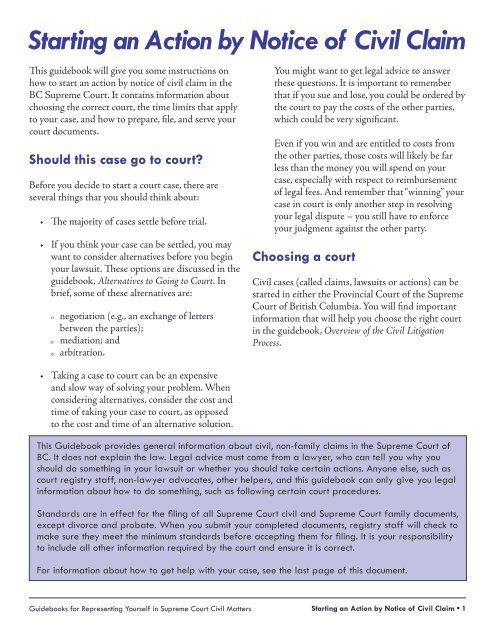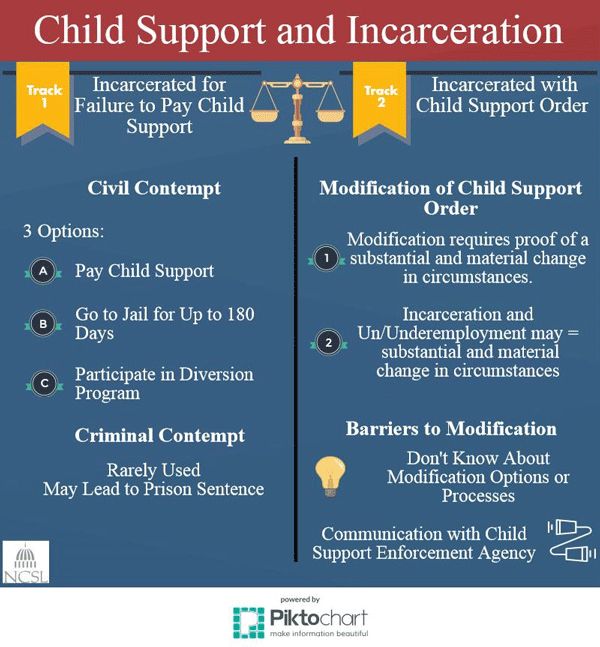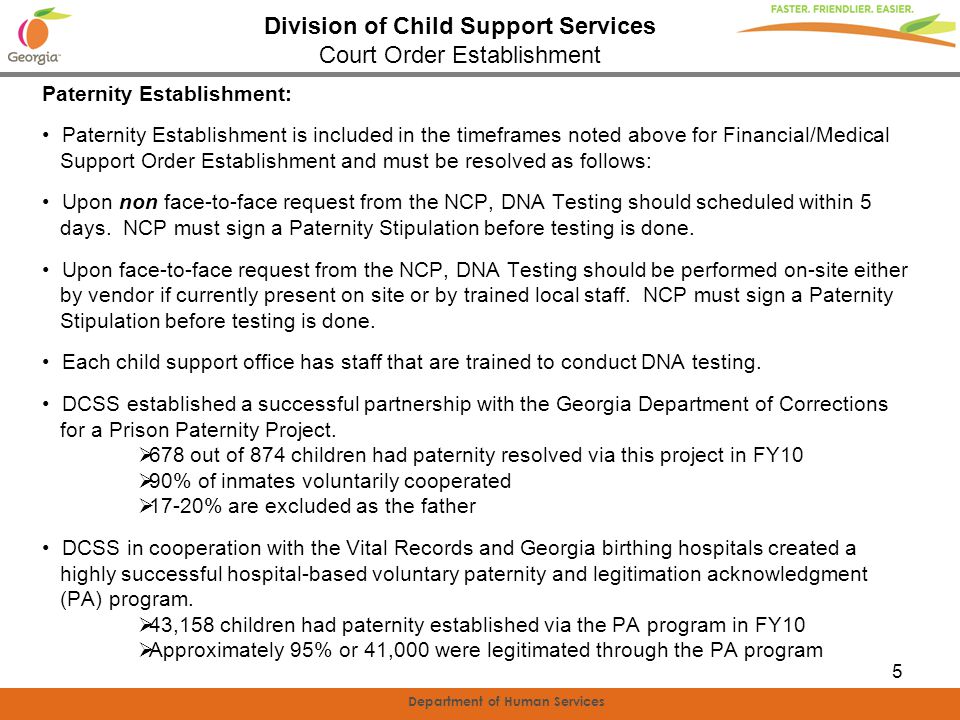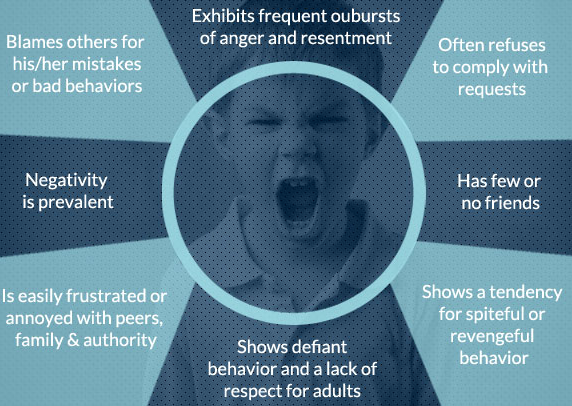How to represent yourself in child support court
Family Law Self-Help Center - Risks and Tips
Many people at family court represent themselves, but there are risks to representing yourself. This page will help you decide whether representing yourself is a good idea, and will give you some tips on how to represent yourself effectively if you choose to go it alone.
Risks of representing yourself
The biggest risk in representing yourself without a lawyer is that you will lose your case! This might happen if:
- You cannot meet all the technical requirements to prove your case.
- You do not follow all the required court procedures. Your case may be dismissed or the other side could win their case against you.
If you lose your case, the judge could order you to pay for the other side's court costs and attorney's fees. So instead of paying for your own attorney to represent you, you could end up paying for the other side’s attorney to represent them!
Use the following checklist to help you decide whether it is a good idea for you to represent yourself. Mark which ones apply to you and your case. The more sections you mark, the more risky it might be to represent yourself and the more you might want to think about hiring an attorney.
I have a complicated case or a case that might become complicated.
I do not feel confident that I can express my ideas and thoughts in writing.
I am usually not on time and have a hard time meeting deadlines.
I want or need legal advice.
I am not available during the day during business hours.
It will be difficult for me to arrange for time off and daycare during the day.
I do not believe I will be able to stand in front of a judge and explain my story.
I am not comfortable doing research in a library or on a computer.
I am worried that the other side will not play fair.
I get angry easily, especially when I am under stress.
I am often frustrated by rules I think are unfair or that I think should not apply to me.
I might be too close emotionally to the case and might not be objective.
My case might require an expert to testify in support of my claims.
I tend to be indecisive, and it is hard for me to make a decision.
There will likely be a lawyer on the other side of my case.
The other side has indicated they will vigorously fight the case.
All or most of the evidence that I will need to prove my case is in the possession of the other side, and the other side will probably not give it up to me easily.
I have a difficult time living with my mistakes and the consequences of my decisions.
FYI!
Even if you decide to represent yourself in your family law case, it is always best to consult with a lawyer up front to find out your legal rights. A family law attorney can help you understand your rights, the law, and give you advice on how to proceed. Visit our LAWYERS AND LEGAL HELP page to learn more.
Tips for representing yourself
If you choose to represent yourself, here are some basic tips and recommendations you should follow to strengthen your chances of succeeding:
-
Learn the laws and rules that apply to your case.

Even though you are not a lawyer, you are still required to know and follow nearly all of the same laws and court rules as an attorney. Understanding the law that applies to your case can help you focus on what it is that you need to prove. You can attend free legal classes where you can learn about the laws and court procedures ahead of time.
-
Make sure all your written submissions are complete, neat, and timely.
The main way you tell the judge about your side of the story is by preparing and filing written documents. If you are using Self Help Center forms, make sure you provide all of the required information in the correct blanks and check all the appropriate boxes. If you are preparing your own documents, make sure they comply with the court's rules regarding written submissions. Always make sure your documents are complete, neat, and legible! If your filings do not convey your arguments accurately and thoroughly – or if the judge simply cannot read your writing – you have missed your chance to get your story in front of the judge.

There will probably be deadlines for many of the documents you will need to file in your case. Make sure you know the deadlines and that you get your documents filed on time.
-
Do not give up without understanding the consequences.
If you are feeling helpless about your case, you might think there is no point in going to court. This can be dangerous, because the court can still make decisions if you are not there. It is best to get legal advice before deciding to give up.
-
Attend all hearings and get to the courthouse early.
Your court hearing is not an appointment that you can simply reschedule if you miss it. If you need to change your court date for some reason, you will need to file legal documents requesting a different court date or get the other side to agree to the change. This must be done before of your scheduled hearing. If you wait too long, it might be too late to change the hearing date.

-
Understand how to prepare for and act in court.
There are a lot more tips on the Going to Court page that explain what to expect at court, how to prepare for your hearing, and what to do (and not do) while in the courtroom.
A Guide to Representing Yourself in Family Court
Family, Divorce & Children
This guide is for parties who do not have a lawyer and are representing themselves in court.
Last Updated on November 2, 2021
OverviewGuide Overview
People who represent themselves in their court cases are also called:
- pro se litigants,
- pro per litigants,
- in propria persona, or
- self-represented litigants.
In Texas civil cases, you have the right to represent yourself. See Texas Rules of Civil Procedure 7 and 120. But you should at least talk to a lawyer before representing yourself. Start by looking for legal help in TexasLawHelp's Legal Help Directory.
Start by looking for legal help in TexasLawHelp's Legal Help Directory.
You will be held to the same standards as lawyers are. Read the ethical rules that attorneys must follow: the Texas Disciplinary Rules of Professional Conduct.
If you face the termination of your parental rights, or have been sued to enforce a family court order, contempt, you may have the right to an appointed attorney. Read The Right to a Lawyer in a Family Law Case.
Research Tips
Start by reading Tips for the Courtroom.
- You can also watch this video: Representing Yourself in Court.
- For a more in-depth guide to representing yourself in a divorce case, you can read the following Guide from the Dallas Bar Association.
- The Texas Young Lawyers Association Pro Se Litigant Guide
Common questions about Court How-Tos (Civil Procedure)
What is "the Rule"? Expand Collapse
In court, you, the other party, or the opposing attorney can invoke “the Rule. ”
”
The Rule prevents all witnesses (except if a witness is the spouse of a party) from hearing the testimony of other witnesses. If anyone invokes the Rule, your witnesses must sit outside of the courtroom and cannot discuss the case with each other. Your witness(es) may spend all day at the courthouse, so prepare them for the time commitment.
Can a child testify in court? Expand Collapse
If you have a minor child witness, you should also let the court know in advance.
Many courts frown upon a minor child missing school for court, and if the case is about that child or children, it is inappropriate to take the child to court without the judge’s permission.
If the case is about which parent the child should live with, and the child is at least 12 years old, they can tells the judge (in the judge’s office, also called "chambers"), who they child wants to live with.
My case involves family violence and I am afraid to appear without help. Expand Collapse
Expand Collapse
It can be unsafe to represent yourself when family violence is involved. To connect you with an attorney or other local resource to help you move forward with your case, try the TexasLawHelp Legal Help Directory. In the "areas of expertise" pulldown menu, select "protection from violence and abuse." Choose your county from the second pulldown menu on the same page.
What does "pro se" mean? Expand Collapse
Pro se means you are representing yourself in a court case and don’t have a lawyer.
Instructions & FormsInstructions & Forms
1-2 Weeks Before Court Expand Collapse
Prepare for court one or two weeks in advance. Follow these steps.
Checklist Steps
Step 1: Check your court’s local rules. Expand Collapse
Texas courts have the power to make their own rules which explain how they handle cases. These rules are called local rules.
These rules are called local rules.
Many local rules are also county-wide: All of the courts in that specific county have adopted the same rules to apply in each court.
Local rules cover:
- court procedures (what time is docket call, scheduling issues, etc.),
- filing legal documents, and
- other administrative matters, such as appropriate court attire and behavior.
You must follow the local rules and any applicable federal or state procedural rules when filing legal documents or appearing in a court. But local rules cannot override any federal or state rules. Local rules only apply in the court that created the rule. Keep in mind that if you are in federal court, the federal rules apply, and if you are in a state court, then state rules apply.
Failure to abide by the local rules could result in your case not being heard by the judge, or at worst, you could face contempt of court for ignoring court rules.
Local rules are usually easy to find on the court’s or county’s government website and usually are posted in the courthouse. You could also do a quick internet search for “local rules in ______________ county [include your county’s name].” Make sure you are reading the most current version of the rules. Texas lists its courts' information in its judicial directory.
You could also do a quick internet search for “local rules in ______________ county [include your county’s name].” Make sure you are reading the most current version of the rules. Texas lists its courts' information in its judicial directory.
Step 2: Know the dress code. Expand Collapse
Many times, you can find the court’s dress code in the local rules. If so, then follow your court’s rules for dress and attire. If you cannot find the court’s dress code, then here are some basic rules to consider before appearing in court.
- You do not have to wear a formal suit and jacket, but if you want to, it is acceptable. Do not feel pressured to purchase one, especially if it is not financially possible. Dress as you would for an important event.
- Dress pants, slacks, khakis, and even jeans (without holes, tears, or distressed) are acceptable, as are skirts and dresses, at an appropriate length. Do not wear shorts.

- Button-down, long-sleeved shirts, with or without a tie, are acceptable.
- Spaghetti straps, crop tops, halter tops, tube tops, and cold-shoulder tops are not appropriate.
- Many courts require visible tattoos and piercings to be covered either with clothing or a band-aid.
- Do not wear baseball caps, hats, and sunglasses. Head coverings should be permitted for religious or medical reasons, but ask the court bailiff or administrator about your request before court starts.
Before entering the building, most courthouses require you to go through security (both a walk-through metal detector and security wand). You may have to remove your belt, jewelry, and other items. Consider dressing so that you do not have to take too much time going through the security line. Also, remove any pocket knives, nail files and clippers, liquids, etc., from your purse, backpack, or bag before entering the building. Otherwise, you would have to carry prohibited items back to your vehicle or dispose of them at the courthouse doors. Do not take weapons into the courthouse.
Do not take weapons into the courthouse.
Be prepared for temperature changes in the courtroom, depending on the time of year and how long you will be in court. If you are hot- or cold-natured, plan to dress in layers or bring a coat or something to stay warm.
Consider your footwear, especially if you have a lot of walking to get to the courthouse or if there are stairs in the courthouse. It is better to be comfortable in an already potentially uncomfortable situation. Do not wear flip-flops. Some courts require you to wear closed-toe shoes, meaning your toes cannot show, so make sure you are prepared if your court has this requirement.
Planning what to wear in advance can not only save you time getting ready on the day of your hearing, but it could also save you from being turned away from the courtroom itself for inappropriate clothing.
Step 3: Prepare evidence and documents. Expand Collapse
Before appearing in court, you need to ensure you have gathered all of your documents and evidence.
Types of evidence include, but are not limited to:
- Testimony. This type of evidence, known as testimonial evidence, is simply a witness giving testimony under oath about the facts of the case.
- Documents. This type of evidence, called documentary evidence, mainly refers to writings on paper and applies to other ways to preserve information. Other ways to preserve information include audio or video recordings, like 911 calls or through a cell phone video.
Documentary evidence includes, but is not limited to, police reports, diaries, letters, contracts, photographs, tape recordings, and print-outs of digital evidence, such as emails, text messages, and social media content.
- Tangible (physical) evidence. This type of evidence consists of objects and things that a judge or jury can physically hold and inspect.
- Demonstrative evidence. Use demonstrative evidence to help explain witness testimony.
 Demonstrative evidence includes charts, maps, and diagrams.
Demonstrative evidence includes charts, maps, and diagrams.
Witnesses. If you have witnesses going with you to court, they must also follow the same rules of the court, so make sure you share this information with them. Let your witnesses know that they must be there when the docket is called and must testify, in person, unless you have obtained special permission from the court allowing them to testify through phone or video.
- The Rule. Also, you, the other party, or the opposing attorney can invoke “the Rule.” The Rule prevents all witnesses (except if a witness is the spouse of a party) from hearing the testimony of other witnesses. If anyone invokes the Rule, your witnesses must sit outside of the courtroom and cannot discuss the case with each other. Your witness(es) may spend all day at the courthouse, so prepare them for the time commitment.
- Child witnesses. If you have a minor child witness, you should also let the court know in advance.
 Many courts frown upon a minor child missing school for court, and if the case is about that child or children, it is inappropriate to take the child to court without the judge’s permission.
Many courts frown upon a minor child missing school for court, and if the case is about that child or children, it is inappropriate to take the child to court without the judge’s permission. - No written statements. You cannot provide a written witness statement in court as evidence—they must be present to testify.
- Prepare written questions. You may want to prepare the written questions you are going to ask your witnesses. Always start with asking them to state their full name, date of birth, age, address, where they work, and how they have personal knowledge of any relevant facts. If helpful to the witness, you may want to go over the questions with them as preparation.
Documents/Exhibits. Ensure that for all documents you have to present to the court, you have an original copy for the judge, along with at least three other copies—one for the opposing party, one for the opposing counsel, and one for the court reporter. The best practice is for the judge’s copy to be one-sided and in color, if possible. The other copies can be double-sided and in black and white. You can label the copies with “Exhibit” stickers, or you can handwrite “Exhibit” on the document. Some courts require the pre-labeling of exhibits. Depending on whether you are the Petitioner or the Respondent, you should label your exhibits as “Petitioner’s Exhibit 1”; “Petitioner’s Exhibit 2”; and so on.
The best practice is for the judge’s copy to be one-sided and in color, if possible. The other copies can be double-sided and in black and white. You can label the copies with “Exhibit” stickers, or you can handwrite “Exhibit” on the document. Some courts require the pre-labeling of exhibits. Depending on whether you are the Petitioner or the Respondent, you should label your exhibits as “Petitioner’s Exhibit 1”; “Petitioner’s Exhibit 2”; and so on.
Evidence is the way that you can prove or disprove the facts in your case. Gathering, presenting, and admitting evidence can be confusing, but you will be held to the same evidence standards as attorneys if you represent yourself in court without a lawyer. You can find the Texas Rules of Evidence here. Know the rules of evidence and prepare in advance.
Hearing/Trial Outline. You may feel more prepared if you decide what you will tell the judge as part of your case. Create an outline and write down important dates, events, and anything you want to remember to say to the judge.
Practice what you will say so you will feel more comfortable presenting your case and make sure you do not forget anything.
Filing Legal Documents. Read the legal forms filed by the other party. If you do not understand some of the language in the documents, talk to an attorney. If you need to file any legal document, make sure you file at least seven days before your hearing or trial and that you provide a copy of the filed document to the other party. See Texas Rule of Civil Procedure 63.
Required Documents and Proposed Order/Decree. As part of their local rules, some courts require certain documents to be filed before a hearing or at least have them ready at the time of the hearing. These documents may be called a “Proposed Disposition of Issues” or “Proposed Requested Relief.” Many courts also require that both parties fill out financial information sheets or a “Proposed Support Decision” in a contested hearing. Check your Local Rules to know if you need to prepare these documents.
You may also want to prepare a proposed order or decree based on your requested relief if you have time. Orders and decrees can be complex, so check with an attorney if you have any questions about preparing one.
Step 4: Arrange for an interpreter, if needed. Expand Collapse
If you need an interpreter for a language other than English, you must request a licensed court interpreter for your court appearance.
Read How to Ask for a Language Interpreter for Your Case.
Notify the court coordinator or court administrator of your need at least one week before your hearing. The best practice would be to request your interpreter when you set your case for a final hearing. You must set your case for a final hearing and give the other parent at least 45 days’ notice of the hearing. Read How to Set a Contested Final Hearing (Family Law) to learn more.
Step 5: More preparation tips. Expand Collapse
Expand Collapse
If you have time, visit the courtroom where your hearing will occur before your actual hearing or trial date. Call the court coordinator or check online for the court’s schedule so you can watch what happens in the courtroom without the pressure of presenting your case on the same day. This will help you see how docket call works and how a hearing or trial works, and you may feel less nervous when the day for your hearing or trial comes.
You can also watch Texas courts’ live streams to get an idea of what to expect. Read Virtual Court.
Forms Required
-
Motion to Appoint a Language Interpreter and Notice of Hearing
TC-PR-LI-104
Use to request an interpreter. Set a hearing for motion, then notify the other party of the hearing.
Download Form
-
Order Appointing a Language Interpeter
CB-AI-101
Submit this form with request for an interpreter.
 If the judge agrees with your motion, the judge will sign the form.
If the judge agrees with your motion, the judge will sign the form.Download Form
-
Motion and Order for Language Interpreter (Spanish) - Guided Form
TC-PR-LI-104-ES-Int
Esta entrevista se utiliza para crear la petición y el orden solicitando un intérprete de idiomas. (This interview is used to create the motion and...
Access Form
-
Ask to Appoint a Language Interpreter - Guided Form
TC-PR-LI-104-Guided
Guided version. Use to request an interpreter. Set a hearing for motion, notify the other party of the hearing, and get and order for the judge to ...
Access Form
The Day of Court Expand Collapse
Know what to expect during your hearing before you go.
Checklist Steps
Step 1: Arrive at the courthouse. Expand Collapse
Arrive at the courthouse at least 30 minutes early to park, go through security, and find your courtroom. You may have to park in a parking garage or around the courthouse in metered parking. Prepare for payment (card and cash to be safe) for the parking meter or garage.
Before entering the building, most courthouses require you to go through security (both a walk-through metal detector and security wand). You may have to remove your belt, jewelry, and other items on your person. Consider dressing so that you do not have to take too much time going through the security line. Expect to have your personal items inspected, so have everything neatly organized ahead of time. Remove any pocket knives, nail files and clippers, liquids, etc., from your purse, backpack, or bag before entering the building, so you do not have to carry the prohibited items back to your vehicle or dispose of them at the courthouse doors. Do not take any weapons into the courthouse.
Do not take any weapons into the courthouse.
Step 2: Before Docket Call Expand Collapse
Getting to the courtroom early is better than getting there on time. In some counties, the courtroom doors may not open until a few minutes before docket call. Some judges in some counties will lock the courtroom doors once docket call begins, so arrive early if you can!
Once you enter the courtroom, you may need to check in with a court coordinator or administrator, bailiff, or clerk. This individual will usually sit next to the judge’s bench. Not all courtrooms have someone present with a sign-in, and your official “check-in” may be when the judge calls the docket, or court schedule, for the day. Make sure you are polite to all court staff.
No food or drinks are allowed in the courtroom. Do not chew gum or eat candy. If you need a cough drop, make sure you ask if that is okay, especially if you are testifying. Do not smoke, vape, or use chewing tobacco. Once your hearing begins, there may be water available for you on the stand if you are testifying.
Once your hearing begins, there may be water available for you on the stand if you are testifying.
Turn your cell phone and any other electronic device off. You may think that silencing your phone or device is enough, but an accidental sound, call, noise from your phone could result in the judge ordering the bailiff to take your phone away. Once your hearing begins and if you need to use a laptop or tablet, you will be able to do so once you take your seat at the counsel table.
Before and during court and between any recess (breaks) of court sessions, you cannot record (audio and video), broadcast, televise, or take photographs. Do not take in equipment capable of doing so. Do not live stream, post, or commentate on what is going on in the courtroom on any social media.
You may have to wait for court to begin or wait while the court hears other cases. Be patient. Some judges do not allow you to bring in books, newspapers, magazines, or electronic devices to read once court begins.
If friends, relatives, witnesses, or legal advocates go to court with you, let them know they must follow these same rules. Do not chat or talk with them in the courtroom after the judge enters.
Step 3: During Docket Call Expand Collapse
When it is time for the judge to enter the courtroom, the bailiff will call out, "All rise." You must stand up once the judge enters the courtroom. If you are physically unable to stand, make sure you let the bailiff know before the court session begins.
In some courts, you will recite the Pledge of Allegiance or Pledge of Allegiance to the State Flag of Texas.
The judge will let everyone know they can be seated and begin to call the docket or the names of cases scheduled for hearings that day.
Once you hear your case called, you must stand up and announce the following:
- Your name;
- Whether you are the Petitioner, the Respondent, or another party;
- That you are representing yourself;
- If you are ready to proceed with your hearing, let the judge know you are ready; and
- How much time you think your hearing will take.

If you are not ready to proceed with a hearing that day, you need to let the judge know. If you need more time to prepare for a court hearing or trial, you may be able to get a continuance. A "continuance" changes the date of a court hearing or trial to a later date. This article tells you how to ask the judge for a continuance. It will be up to the judge to decide if your hearing will be continued and reset. If you can reach an agreement with the opposing party or opposing counsel to reset the hearing, you can enter into a Rule 11 Agreement. You can find more information on Rule 11 Agreements here.
The judge will let you know when they expect to hear your case. They may ask you to wait in the courtroom, or they may tell you to come back at a specific time or after the lunch hour. Often, judges expect parties and their attorneys to confer or speak to each other about any possible agreements before a hearing. If you have time to do so, it is encouraged, and you can discuss the case outside of the courtroom or in any available conference rooms.
Do not discuss anything inside the courtroom while the rest of the docket is being called. Ask the judge to be excused or to leave the courtroom if you want to confer about your case. If you can reach some agreements, you may want to include those agreements in a Rule 11 Agreement. You can find more information on Rule 11 Agreements here. If you can reach some agreements or a full agreement, you can go back into the courtroom to let the bailiff know you have an updated announcement for the judge, that you have a deal and will not need a hearing at all or that you will need less time for your hearing.
Always stand when the judge speaks to you. When you talk to the judge, call the Judge "Judge ______ (last name)" or "Your Honor."
Because the judge may not call your case right away, you may need to use the bathroom or go in the hall for fresh air. If at any time you need to leave the courtroom, let the court coordinator or administrator, bailiff, or clerk know where you are going.
Step 4: During the Hearing Expand Collapse
Once it is time for your hearing to begin, the judge will ask you to be seated at “counsel table.” Take all of your belongings, evidence, and documents with you. The opposing party and their attorney, if any, will sit at the other counsel table. Most counsel tables will have a microphone. Make sure you learn how to turn it on and off or ask for help.
Witnesses. If you have witnesses, you will need to let the judge know that you have witnesses—and they will be called in one by one to give their testimony. You cannot provide a written statement of a witness in court as evidence. You may want to have already written out the questions you are going to ask witnesses. Always start with asking them to state their full name, date of birth, age, address, where they work, and how they have personal knowledge of any relevant facts. Once you finish with a witness, the other party will also have the chance to ask them questions.
The Rule. Any witnesses can stay seated in the courtroom unless someone invokes “the Rule.” “The Rule” is a rule of civil procedure that prevents all witnesses (except if a witness is the spouse of a party) from hearing the testimony of other witnesses. If the Rule is invoked, your witnesses must sit outside of the courtroom. They cannot discuss the case with each other. Your witness(es) may spend all day at the courthouse, so prepare them for the time commitment.
Opening statements. The judge may ask both parties if they have an opening statement. An opening statement is a brief statement of what you are planning to present to the court, what you believe the evidence will show, what you are asking of the court, and may include any supporting case law or statutes.
Stand when you speak to the judge. Always stand when you address the court or speak to the judge. When the judge speaks to you, stand up. You do not have to stand if you are on the witness stand, though. When you talk to the judge, call the Judge “Judge ______ (last name)” or “Your Honor.” Do not interrupt the judge or speak out of turn if the opposing party or counsel is speaking. You will have your turn to speak.
You do not have to stand if you are on the witness stand, though. When you talk to the judge, call the Judge “Judge ______ (last name)” or “Your Honor.” Do not interrupt the judge or speak out of turn if the opposing party or counsel is speaking. You will have your turn to speak.
About being sworn in. When it is your time to testify, the judge will have you raise your right hand and swear to tell the truth. Perjury—making a false statement under oath—is a crime in Texas. See Texas Penal Code chapter 37. So, tell the truth and do not exaggerate when telling your story or answering questions from the judge, opposing party, or counsel. Give complete answers.
Be calm and clear. Speak slowly and clearly because the court reporter will transcribe everything said, or the judge will audio record the proceeding. Say “yes” or “no” out loud. It is not enough to nod or shake your head, and neither the court reporter nor the audio recorder can pick up your nonverbal movements. If you do not understand a question, say, “I don’t understand.” If you do not know an answer, say, “I do not know.” If you need a question repeated, ask for the question to be restated or even rephrased. Stay calm and do not get upset on the stand, even if you are frustrated. Make sure you do not use any obscene or offensive language when testifying.
If you do not understand a question, say, “I don’t understand.” If you do not know an answer, say, “I do not know.” If you need a question repeated, ask for the question to be restated or even rephrased. Stay calm and do not get upset on the stand, even if you are frustrated. Make sure you do not use any obscene or offensive language when testifying.
You will need to give testimony. Some judges will ask you questions. Other judges will want you to read a “script” of testimony. You can find sample scripts—called “prove-up testimony”—on TexasLawHelp. Read the script ahead of time. Make sure everything in the script is true for you.
The judge will listen to what you say and review your evidence. Sometimes, the judge may ask you questions. The other party will have this same opportunity, and you will have the chance to ask questions of the other party.
Objections. If the other party begins testifying to something and you have a legal objection, you must stand and tell the judge you “object” to their statement and the legal reason why you object. The judge will then decide if the person on the stand can continue with their statements or not.
The judge will then decide if the person on the stand can continue with their statements or not.
Showing evidence to the judge. If you need to present the judge with any evidence or exhibits, you must ask permission. You can say, “May I approach the bench, Your Honor?” and the judge will let you know if you are allowed to take the exhibit up to the bench. Make sure you also give copies to the opposing party and the opposing attorney.
No recordings. During court and between any recess (breaks) of court sessions, you cannot record (audio and video), broadcast, televise, or take photographs. Do not take in equipment capable of doing so. Do not live-stream, post, or comment on what is going on in the courtroom on any social media.
Step 5: Wrapping up. Expand Collapse
Ending testimony and resting the case. Once you finish testifying and have called the witnesses you wanted, and the court has accepted your exhibits, you can let the judge know that you have finished presenting your case. You may tell the court that you “rest.” Then, the other party will have the opportunity to present their case if they did not present their side of the case first.
You may tell the court that you “rest.” Then, the other party will have the opportunity to present their case if they did not present their side of the case first.
The court's decision. Once both parties have presented their sides of the case, the judge will make a decision or ruling. Sometimes, a judge may call a break, or recess, before giving their ruling. A judge may also not decide that day and take some time to review the evidence presented and do additional research. This is called taking the case “under advisement.” If the judge decides to take your case under advisement, they will let you know when to return to court for the ruling, or they will let you know how they will deliver their ruling, usually in a written document.
If the judge grants your requests, then you may present the judge with your proposed Order or Decree. If not, then an Order or Decree will need to be prepared to match the judge’s ruling.
Forms Required
-
Rule 11 Agreements - Divorce with Children - Initial Disclosures (Travis County)
FM-TCLL-Disc-1100
Use this form to waive the requirement of initial disclosures from an opposing party in a divorce suit.

Download Form
-
Rule 11 Agreements - Divorce with Children - Initial Disclosures
FM-Disc-DivBC-1101
Use this form to waive the requirement of initial disclosures from an opposing party in a divorce suit.
Download Form
-
Rule 11 Agreements - Divorce with Children - Initial Disclosures
FM-Disc-DivBC-1101
Use this form to agree to waive initial disclosures in a divorce with children.
Download Form
After the Hearing Expand Collapse
Court may be over, but there is more to do.
Checklist Steps
Step 1: Know your deadlines. Expand Collapse
Deadlines. Once your hearing is over, you want to make sure that you understand any deadlines given by the judge. One deadline may be for a de novo hearing, if your case was heard by an associate judge. See Texas Family Code 201.015. The more common deadline is for appealing a judgment. This article discusses appellate timelines. Speak with a lawyer immediately if you do not understand these certain deadlines. Once the court loses power to make rulings or act in your case, you may lose out on your chance to properly contest the court’s ruling.
Step 2: Do you understand your orders and obligations? Expand Collapse
Orders and Obligations. You also want to make sure that you understand any obligations and orders given to you by the judge. This may include who prepares the final Order or Decree, any payment obligations, or any other order associated with your case. Following your Order or Decree is important to avoid any future legal action for violating or not following the court’s orders. Failure to follow your court order could result in an enforcement lawsuit against you.
Following your Order or Decree is important to avoid any future legal action for violating or not following the court’s orders. Failure to follow your court order could result in an enforcement lawsuit against you.
Step 3: Did the judge sign your orders? Expand Collapse
Make sure that a final Order or Decree is signed by the judge if one is not signed on the day of your hearing. Not having a precise order or any order at all could result in legal problems down the road, including enforcement issues with visitation, child support, or in a divorce, a property and debt division. Consider getting either a regular copy or a certified copy of your Order or Decree once it has been signed by the judge and filed with the clerk’s office. Call your clerk’s office to find out what the cost is to get these types of copies. For any concerns about your children, certified copies are usually required for law enforcement, schools, and some medical providers.
Step 4: Make sure ALL orders are signed. Expand Collapse
Other orders may also be required to be signed by the judge. If you have child support, the judge will need to sign an Income Withholding Order for Support so that child support can be taken out of the obligor’s (the person required to pay child support) paycheck. You may also have a name change order if you are changing your name as part of your divorce. Make sure you know which orders you need to finalize your case.
Step 5: Complete and file state-required forms. Expand Collapse
If your case is setting up child support for the first time, then the Texas Office of the Attorney General requires this Record of Support form to be completely filled out and signed. You can submit the completed form to the clerk.
Texas’ Vital Statistics Unit requires this VS Form-165 to be filled out for all divorce cases and suits affecting the parent-child relationship, except for adoptions. Make sure this form is filled out and provided to the clerk.
Make sure this form is filled out and provided to the clerk.
Forms Required
-
Record of Support Order
Form 1828A (ROS/App)
This completed form must be submitted to the county’s clerk of the court to set up the child support account.
Download Form
-
Information on Suit Affecting the Family Relationship (Excluding Adoptions)
VS-165
Information sheet for reporting divorce, annulment, and SAPCR cases to Texas Vital Statistics Unit.
Download Form
Articles in this guide
how to file a claim, how the meetings are held and how much it costs
Veronika Netsova
established paternity for a child in court
Author profile
I gave birth to a child not in wedlock and did not record his father in the birth certificate.
Five years later, I sued to establish paternity and collect alimony. I won the case, although I spent 11 months and about 87,300 R on it. That's how it was.
Why I decided to establish paternity
When my daughter was born, my ex and I didn't communicate anymore, so I didn't even write him on my birth certificate. A month after the birth of the child, we resumed communication, but we failed to build a family. The former could come and play with his daughter, but did not help financially.
At the same time, raising a child is not free, and like any mother, I needed money for food, diapers and clothes for my daughter. So I decided to establish paternity in order to receive child support and ensure that he has the right to claim the father's inheritance if he dies.
There was a good reason for not including the father on the birth certificate in the first place - so I could enroll my child in kindergarten without waiting in line. Thanks to this, my daughter went to kindergarten at 1 year and 11 months, and I was able to go to work.
I also received an increased monthly allowance for a child up to 1.5 years. True, the difference between the payment for complete and single-parent families was small. For example, now it is 1081 R: a full family is paid 3721 R per month, an incomplete family - 4802 R. I have already talked about benefits for single parents in the article "What benefits are provided to a single mother in Russia".
The desire to go to court haunted me for several years, while I was doing more important things for myself. For example, I was looking for my purpose in work, studied and tried to provide an income that would suit me. In addition, I understood that in order to sue, money is needed.
T-F already has a detailed guide on when and how paternity is established. In short, when a child is born in a marriage, paternity is established automatically: the husband is simply entered on the birth certificate of the child as the father.
Art. 17, 48, 50 of the Law "On acts of civil status"
If the parents are not married, the record of the father is made on the basis of a joint statement of the parents on the establishment of paternity. And if the father or mother of the child is against such a statement, the data on the father may not be entered at all - then a dash is put in the birth certificate in the column "father". It was the same with my child.
Joint statement of paternity - form No. 15
This is how my daughter's birth certificate looks like - in the column "father" a dashHow I filed a statement of claim
To establish paternity in court, you need to draw up and file a statement of claim. You can do this on your own or with the help of a lawyer. I made a claim myself using a template from the Internet.
Template of a statement of claim for establishment of paternity and recovery of alimony
The structure of my claim was as follows:
- A cap indicating the name and address of the court to which I filed the application - the Vyborgsky District Court.
- Data about me, the plaintiff, and my former defendant. I indicated our full names, postal addresses, telephone numbers.
- Title - "A statement of claim for the establishment of paternity and the recovery of alimony."
- Description of the relationship between the plaintiff and the defendant - when we met, how many met before the child was born, and how the defendant reacted to his birth, why paternity was not established by joint application. In my application, this description took three paragraphs - I wrote that we started dating in June 2014, and the respondent found out about my pregnancy in February 2015. Then he reacted positively to this news, and we even went to the antenatal clinic together to register for pregnancy. But in March 2015 - at 12-13 weeks of my pregnancy - he announced that we were breaking up because he started dating another girl. Later, the defendant recognized his daughter and communicated with her until June 2016. But by the time he went to court, he no longer participated in education and did not help financially.
- Evidence that we actually met and a child was born as a result of our relationship.
What evidence I had, I will tell further.
- Requirements for the court - to establish paternity and collect alimony from the defendant. More about my requirements - later in the article.
- Attachments to the claim.
A claim for establishing paternity and collecting alimony is filed with the district court at the place of residence of the plaintiff or defendant. I filed a lawsuit with the Vyborgsky District Court of St. Petersburg. Initially, I chose it because I had a permanent registration in this area. But shortly before the first court session, I registered in another region - in the Belgorod region.
p. 3 art. 29 Code of Civil Procedure of the Russian Federation
The court noticed this, said that it could not take the case, and offered to transfer it to another court - at the place of my permanent registration or at the place of registration of the defendant in the Nevsky district of St. Petersburg. I chose the second option, the defendant's representative was not opposed, and the case was transferred there.
Evidence must show that the defendant is indeed the child's father. These can be, for example, fragments of correspondence with the mother and joint photographs, audio and video recordings, testimonies of witnesses.
I have attached screenshots of correspondence from VKontakte, joint photos of the defendant and the child, a map of the pregnant woman, where my ex is listed as the father of the unborn child, because we registered together for pregnancy.
I also asked the court to invite two witnesses - my girlfriends, who were aware of our relationship. In the lawsuit, I indicated their full name, residential address and phone numbers. I asked the witnesses in advance if they were ready to participate in my case in court and if it was possible to indicate their data in the lawsuit. But the court did not call them, and as a result, witnesses were not needed at all.
A page from a pregnant woman's card, where the father of the child is indicated as the husband.There is only one requirement in the statement of claim to establish paternity - to establish paternity. But if you immediately want to resolve the issue with alimony, then you can specify one more requirement - to collect alimony. You can also demand to recover some additional expenses for the child.
Child support can be collected in a fixed amount of money or as a share of the parent's income: ¼ for one child, ⅓ for two children and ½ for three. If the father works officially and has a constant "white" income, it is better to collect alimony as a share of income. If the income is not regular or "gray" - in a fixed amount of money. Details on how to file for alimony, how much money and for what you can claim, I have already told in another article T-Z.
Initially, in the statement of claim, I had three requirements:
- Establish paternity of the defendant
- Collect alimony from him in the amount of ¼ of all types of earnings from May 29, 2020 until the child reaches the age of majority - I later changed this requirement.
- To collect compensation from him for housing for a child - 11,000 R, this is half the rent for an apartment that I rented for myself and my daughter.
Later, instead of alimony as a share of income, I demanded alimony in a fixed amount of money. The fact is that the father of my child does not work for hire - he has an LLC, in which he is a director. And, as a director, he can draw for himself any salary, even 5000 R. And the court will exact a share of the child from her. This happened to us - the defendant brought a certificate with an average salary of 33,454 R per month. If I continued to insist on child support in a share, then on the basis of the income statement for 2020, it would be possible to recover 8363.5 R per month, and in a fixed amount of money it would be possible to recover 11,607.5 R per month.
11,607 Р
alimony that I collected from my daughter's father
Attachments to the claim I had the following:
- A copy of the child's birth certificate.
- A document confirming the cohabitation of mother and child - in my case, a tenancy agreement, which states that I will rent an apartment with my daughter.
- Evidence of the relationship between the plaintiff and the defendant, as a result of which the child was born - I talked about them above.
- Notice of sending a copy of the claim to the defendant.
I received a claim with these applications, but in the process the court asked me to provide a copy of my passport as well.
On the Internet they write that a certificate of cohabitation with a child from a management company must be attached to the statement of claim. I did not take it - the apartment rental agreement was enough.
It is not necessary to pay the state fee when filing an application: the court will collect it from the defendant.
sub. 2 p. 1 art. 333.36 NK RF
How I filed a lawsuit in court
Online an application is submitted on the website of the State Antimonopoly Service "Justice". To do this, you need to log in using an account on the public services portal and fill out an application template. If you are not registered for public services, you will not be able to apply in this way.
The site accepts applications and attachments to it only in PDF format. Therefore, convert all files that you plan to send to court into it in advance.
You can also track the progress of the claim on the website.
The first time I filed a claim online, it was not accepted there. I think this happened because I did not attach a notice that I sent a copy of the claim to the defendant. The second time I sent a claim by mail.
To file an application on the website of the State Antimonopoly Service "Justice", select the section {section "Submit an appeal".} https://ej.sudrf.ru/appeal/) In it, find the section "Civil Litigation" and click on the button "Submit Application" Then click on the "Statement of Claim" to go to the application template.In person. An application with all attachments can be brought to the court office. There it will be checked and accepted for production if everything is in order with the application. Or they will refuse, explain the reason and tell you what to do so that the next time the claim passes the test and is accepted.
I was unable to file a lawsuit in person because due to the pandemic, the courts were closed to visitors and only accepted applications online or by mail.
Post. All documents can be sent to the court by registered mail. And calculate the cost of sending - on the website of the Russian Post.
A copy of the statement of claim and attachments must be sent to the defendant and to the registry office - he is involved in the case as a third party. All by registered mail with acknowledgment of receipt. It is important to put checks in the envelope for the court confirming that you have sent documents to other participants in the process.
The plaintiff needs to send documents to other participants in the process on his own
I sent all the documents by mail. First of all, I sent the statement of claim and attachments to it to the defendant. Then - to the court, attaching a check to the claim confirming that the defendant will receive a copy of the claim. Spent about 500 R. on postal services.
I didn't know that the documents had to be sent to the registry office. But when my application was received by the court and was accepted for proceedings, the court sent me an SMS asking me to do this before the preliminary hearing.
Message from the court with a request to send a copy of the claim to the registry office. True, no one from the registry office ever came to our trialHow my trial went
I had six court sessions, and the whole process took 11 months - from June 30, 2020 to June 2, 2021.
I tracked the progress of the claim on the website of the Vyborgsky and Nevsky District Courts. It was received by the Vyborg Court on June 30, and the judge accepted it on July 3 and scheduled a preliminary hearing for September 9. I attribute the two-month delay to the pandemic: because of it, the courts suspended their work for a while and probably accumulated a lot of cases.
On the website of the court to which you filed an application, you can track how the application is progressing And the whole case as a wholeHow did the preliminary hearing go
First, the court appointed us a preliminary hearing. Usually they find out the details of the case. For example, is there enough evidence provided and is the statute of limitations violated.
Art. 152 Code of Civil Procedure of the Russian Federation
The limitation period is how much time has passed since the violation of the plaintiff's rights. Usually it is three years. If we talk about establishing paternity, then there is no statute of limitations here - the mother has the right to sue before the child reaches the age of majority. And after the age of majority, the child himself can apply to the court. I filed a lawsuit when my daughter was five years old.
Also at the preliminary court session, the parties may file motions, that is, additional requirements. For example, about changing the form of alimony or collecting additional expenses.
In my process, I came to the preliminary hearing on September 9 to represent the defendant, his lawyer. And the only thing that happened that day was that the court indicated that I had filed a lawsuit in the wrong place, and we agreed on the transfer of the case to the Nevsky District Court. I have already talked about this above.
I have not made any motions at that meeting yet - I did it later.
Before, during and after the meeting, I was nervous. I did not know at all how to behave in court, what to say, how to defend myself. I didn't even know that as soon as the judge addresses you, you need to stand up to answer the question. In addition, the judges communicate formally and, it seemed to me, rather rudely. I wasn't ready for this.
In addition, in the corridor of the court, the defendant's lawyer sat down with me, asked why I filed a lawsuit, and offered to agree that I withdraw my application, and the defendant would allegedly pay alimony without a court decision. I refused, but it was then that I decided that I wanted to take my representative: I was too anxious to be alone.
Most likely, I was so worried about the fact that I am soft and honest, and any injustice drives me into a misunderstanding and a complete stupor. I don’t understand how you can refuse your own child, not go out to talk and threaten that I won’t be able to take the child abroad in the future. Therefore, for myself, I decided that I would be more comfortable if my interests were protected by a person with education and experience.
I found a lawyer for my case at Profi-ru. I posted an ad there, got several responses and settled on the very first one. I liked that the lawyer calmly answered all my questions, talked about the consequences of certain decisions, herself went through the experience of establishing paternity in court and generally specialized in family law.
/sharlatan/
How to determine that your lawyer is a charlatan
The work of a representative cost 60,000 R, the fee was fixed and did not depend on the number of meetings or the duration of the process. I paid another 1800 R for a power of attorney. Half of this money - 30,000 R - as a result, I recovered from the defendant, but in fact I have not received it yet - I am waiting for a writ of execution.
60,000 R
I paid for the services of a lawyer
After discussing everything over the phone, we met, concluded an agreement, issued a power of attorney to represent my interests in court and began to wait for the next summons. Thanks to the representative, I could not go to court hearings and not worry that something would go wrong there.
Now, having lived all this experience, I understand that in such a process that I had, it is possible to manage without a representative. For example, you can simply consult with a lawyer and draw up a strategy in advance on how to behave at meetings, what to talk about, what to insist on, what to ask, and so on. But then I was calmer with the representative.
How were the second and third meetings
The second meeting was scheduled for 17 November. Only my representative came to it, so the meeting was postponed to December 7th.
According to the rules, if one party does not come to the meeting, the court postpones it to another day. But in case of repeated non-appearance, the case can be considered without it.
paragraph 2 of Art. 167 Code of Civil Procedure of the Russian Federation
Both representatives came to the third meeting. And the defendant's representative stated that the child was not the defendant and they denied everything. The defendant did not substantiate this in any way, he simply said that the child was not his - without evidence. Then my representative insisted on an examination.
The fact is that an examination is the only way to prove paternity. Even if there are photographs, correspondence and testimonies of witnesses, most likely the court will still appoint her. The pain is that, as a rule, the plaintiff pays for it, and it costs a lot.
For example, in St. Petersburg I paid 25,500 RUR for an examination. And if there were two children, I would have to pay 32,400 RUR. asked the judge to post-pay for the examination, that is, that it be paid by the one who is wrong. The judge refused, without giving any reason for this refusal, and appointed an expert examination for December 28, 2020. At my expense.
How did our forensic medical examination go
The examination took place in the forensic medical examination bureau.
Me, the child and his father arrived at the office at the appointed time. If one of us had not arrived, the court would have ruled in favor of the other side. For example, if the defendant had not arrived, he would have been automatically recognized as the father of the child, even if the examination had not confirmed this.
p. 3 art. 79 Code of Civil Procedure of the Russian Federation
I took three documents with me: a court ruling on the examination, a passport and a child's birth certificate. I also grabbed two copies of each document, but they were not useful.
The child and I arrived early, but the respondent was already sitting there. A couple of minutes after our arrival, an employee of the bureau came out and asked me for documents in order to make copies. I offered her to take mine, but she refused. Then she asked who pays for the examination - it was me - and brought a contract for the provision of services. She asked me to sign three copies and pay for the service at the box office. The examination cost 25,500 rubles.
Me, the child and the father of the child went to the office to take tests. We had two employees with us. On the spot, we filled out one paper and signed small cardboard pads on which we were preparing to collect our blood.
In TV shows, when they take a DNA test, the characters spit into a test tube or bring their hair. We donated blood from a finger, and saliva was taken from our daughter, as she did not want to donate blood. The experts did not insist and simply brought a tool for collecting saliva - a long wooden stick with a large cotton wool at the end.
I signed the package from the wand in which the expert put my daughter's analysis. And we left the center. In terms of time, everything took 40 minutes.
The results of the examination were waiting for two months - on March 2, 2021, they called me from the court and said that the next meeting would take place on March 16. This means that the results are ready, and the court will announce them. According to the rules, the medical organization sends the results of the examination directly to the court, and he already invites the parties and announces them at the meeting.
How the fourth and fifth meetings were held
The fourth meeting was scheduled for March 16, 2021, two and a half months after the examination.
I came to the meeting with a lawyer to find out the results of a genetic test. The test confirmed the relationship between the respondent and the child. What this whole circus was for is not clear, but the experience is interesting.
At this meeting, we made additional demands - we asked the court to recover from the defendant:
Art. 39 Code of Civil Procedure of the Russian Federation
- Alimony in a fixed amount of money instead of a share of income - 11,303 R monthly.
- Expenses for genetic testing — 25,500 RUR
- Costs for issuing a notarized power of attorney — 1800 RUR
- Costs for legal fees — 60,000 RUR
- Costs for paying a pool requirement — for 1 child I did not immediately declare, because when I filed a lawsuit, the child had not yet gone to the pool.
The judge accepted the demands, but not the decision. She asked for information on the income of each party, the availability of housing and family composition, and scheduled the next meeting for April 20.
To fulfill this requirement, I ordered a 2-NDFL certificate at work, made a copy of the agreement on participation in shared construction - I don’t have property, but a new apartment is being built for me and my child - and asked my mother to make a certificate of family composition and send it to me mail. Shipping cost about 100 R.
At the fifth meeting on April 20, 2021, I was not present - all the documents from me were handed over to the court by the representative. The defendant in this meeting provided only a certificate of income for 2020 and no other documents. And I never understood why the court turned a blind eye to this.
The judge accepted the documents and scheduled the main hearing for June 2.
This is a certificate of the defendant's income for 2020 with a small salary - the court accepted it.How our trial ended
The last court hearing in my case took place on June 2, 2021. It was attended by me, my representative and the defendant's representative.
At this meeting, the court made a decision in which it ruled that the defendant is really the father of my child, and therefore he must pay alimony for him - 11,607.5 R per month. This is the size of the children's living wage in St. Petersburg. Alimony was appointed from June 30, 2020 until the daughter comes of age.
In addition, in the decision, the court decided to recover from the father of the child the full cost of the examination - 25,500 R and half of my expenses for a representative - 30,000 R. This is normal - as a rule, it is not worth counting on full compensation for all expenses, because the court itself decides how much to reimburse them. And he usually recovers the costs of the examination from the losing party in full, but not the cost of the representative's services.
Full list of what can be recovered from the losing party
Here are a couple more similar examples from court practice.
In Irkutsk, a woman sued to establish paternity and collect alimony and asked the court to reimburse the costs of the examination in the amount of 19,500 R. The court fully satisfied her requirements.
And in Dagestan, a woman asked the court to recover from the defendant the costs of an examination in the amount of 35,535 R and for the services of a lawyer in the amount of 38,000 R. The court partially satisfied her requirements: the costs for the examination were recovered in full, for the services of a lawyer - in part, in the amount of 21 000 R.
The rest of what I requested - the costs of a power of attorney and payment for a swimming pool for a child - the court decided not to recover without justifying it. Of course, this could be appealed, but I did not do this.
In total, I spent 87,300 RUR on the court. And in this amount, I have not yet taken into account the costs of postage, travel to and from the courthouse, printing documents and other trifles. It seems that all this took about another 2000-3000 R.
87 300 R
I spent on the court
Neither I nor the defendant appealed against the court decision.
What you need to know if you want to establish paternity in court
- You need to establish paternity in at least two cases: to receive child support and so that the child has the right to inherit from the father if he died.
- A claim to establish paternity is filed with the district court at the place of registration of the mother or father of the child.
- During the trial, the court takes into account any evidence about the child's origin from a specific person, but judging by judicial practice and personal experience, it will not be possible to do without a genetic examination.
- The money for the examination and other legal expenses can be collected from the father of the child if the relationship is confirmed.
Alimony recovery lawyer – European Legal Service
We will consult, prepare documents, collect alimony quickly at a fixed price. Let's get to work on collection at any stage.
- 98.7% of cases our lawyers completed successfully for client
- B 10 times is cheaper than a regular child support lawyer
- Since 2007 1593 clients have received child support thanks to us
Customer reviews
I have two children, I bring them up alone. The ex-husband left for another, and does not help in any way. It was not possible to peacefully resolve our family issue. I had to contact the EJSC to understand what to do first. Received professional advice and assistance in filing a claim. Now I know that he will not escape responsibility.
Tagui Tumanyan
I can't stand litigation because I don't understand anything about it. But when the husband hid his income, in order not to pay alimony, he had to turn to the EUS. Through work with bailiffs and other authorities, we managed to prove our case. Thanks to the professionals who helped at every step! Anna, 32 years old, Moscow.
Anna Kozlova
The ex-husband did not pay child support to his sister, evaded and denied that his income was above average, saying that he was ready to pay the minimum wage. But we knew his real income and, together with the lawyers from the EJC, prepared all the necessary papers for the recovery of money and won the court. The cost of the tariff is fully justified. One of these days, her ex-husband is due to fork out.
Nika Shvedova
For three years my brother paid alimony to his ex-wife by court order, while his son lived with her. But now he is raising him himself. Why should he pay if he provides for the child? I advised him to apply to the EUS, I had a certificate - a free option for my brother. After a couple of consultations and collection of documents, the court decision was canceled, and the brother is free from these payments. Good service, thank you lawyers!
Dmitry Meleshko
I do not evade payment, but I want everything to be fair. My wife first filed for divorce, and then sent me a calculation of alimony, obviously overpriced, I won’t pull it. It was not possible to reach an agreement. I had to hire lawyers. Found EUS, thanks guys. Reduced the payment by almost two.
Mikhail Stepanov
How we can help you
collect child support
Alimony advice
Our child support lawyers will provide an expert assessment of your situation and answer any questions regarding alimony and the procedure for their collection. You can seek legal assistance by phone or chat at any time of the day, when You will be comfortable 24/7.
Judicial Perspective Assessment
Alimony lawyers and attorneys will prepare a written opinion on the most likely prospect of a child support litigation and enforcement proceeding - this is the best way to get an assessment of the situation and expert advice on next steps.
Calling a lawyer to a debtor regarding child support
Our child support lawyers will represent you in dealing with any third party in matters of child support. Child support can be denied, so it is often best to start by negotiating with the debtor to reach an agreement to pay child support.
Preparing documents for child support
Support lawyers help you prepare any legal documents needed to collect child support. The prepared document remains only to be signed and submitted to the appropriate authority.
Defense in court
enforcement through the courts. Our child support lawyers can help protect Your rights and the rights of your child and will achieve the appointment of maintenance payments in your benefit. The trial is possible without your participation, this will not affect the results affairs.
Enforcement proceedings
Once the judgment has become final, our child support lawyers control its execution by bailiffs, and in case of violation appeal misconduct by bailiffs.
If you have any questions, make an appointment with a child support lawyer. At us professionals who know exactly what needs to be done to protect your rights and the rights of the child!
Victories of our alimony lawyers
Case study
Case number: 2-2103/2016 ~ M-1854/2016.
Essence: Establish paternity and collect maintenance for a minor child.
Result: The claim was satisfied. Paternity established and recovered alimony from the date of applying to the court simultaneously in shares (1/4) and in a fixed amount of money (half of the living wage for children in the region).
Case Reference
Case Study
Case Number: 02-9340/2021 ~ M-7526/2021.
Essence: Collect alimony for the maintenance of minor children.
Result: The court exacted alimony in the amount of 1/4 of the income per minor child from the moment of filing an application for a court order to recover alimony.
Case reference
Case study
Case number: 2-2544/2020 ~ M-15439/2019.
Essence: Collect maintenance for the maintenance of an adult disabled family member.
Result: Court ordered maintenance for disabled member families in a fixed sum of money from the amount of 74,760.50 monthly from the date entry decisions into force.
Case reference
Case study
Case number: 02-2101/2022 ~ М-7382/2021.
Essence: Collect maintenance for the maintenance of a minor child.
Result: The claim was partially satisfied, alimony was collected in solid monetary less than the amount claimed in the claim.
Case Reference
Case Study
Case Number: 02-1909/2022 ~ M-6632/2021.
Essence: Collect maintenance for the maintenance of a minor child.
Result: Claim satisfied, alimony collected in hard cash amount.
Case reference
Over 250 qualified lawyers on staff
Antonova Marina Alexandrovna
Leading lawyer for the recovery of alimony
experience: 11 years
consultations: 30000
Avanesov Yuri Petrovich
Leading lawyer in housing law
experience: 15 years
consultations: 66 000
Ivashchenko Srbui Sargisovna
Leading lawyer in housing law
experience: 16 years
consultations: 30361
Lupu Valentin Ivanovich
Leading lawyer
experience: 17 years
consultations: 23667
Mikhailov Dmitry Alexandrovich
Leading lawyer in civil law
experience: 10 years
consultations: 14000
Spiridonov Alexander Nikolaevich
Leading lawyer in tax law
experience: 20 years
consultations: 58000
Steps to Get Support Lawyer
1. Purchase tariff
Choose the tariff plan that suits you or leave a request - our specialists help you find the best solution for you free of charge.
2. Refer the task to a lawyer
Our service is available 24/7 and seven days a week. Contact us by phone 8 (800) 333-93-91 or ask a question online family law lawyer in your personal account.
3. Get child support
We will consult, prepare documents, collect alimony.
C EUS return alimony simply!
Documents for applying to the court for the recovery of alimony
List of documents
What documents are needed to apply to the court for the recovery of alimony
Download Sample
How to claim child support
A child support agreement can provide for any method of payment of alimony, for example:
- as a share of the payer's earnings or other income;
- in a fixed amount of money, which is paid at a time or periodically;
- provision of property.
The method list is open. However, if it was not possible to agree, then the court will determine one of the three forms of alimony: fixed amount, interest, mixed alimony.
1. A fixed sum of money income. The conditions under which the court will appoint alimony in a fixed amount of money are specified in articles 85, 87, 91, 94-95, etc. of the Family Code of the Russian Federation
2. Interest on income
As a general rule, alimony for minor children is collected monthly in a share in relation to earnings and other income.
- for one child - 1/4, or 25 percent,
- for two children - 1/3, or 33 percent,
- for three or more children - half of the salary, or 50 percent
3.
For minor children, the court has the right to order the payment of alimony at the same time in the form shares from monthly income and in a fixed amount of money. Apart from minor children, no one not entitled to receive mixed support.
When is it enough to apply for a court order to collect alimony order?
Apply for a child support order if both three conditions are met (paragraph 5 of article 122 of the Code of Civil Procedure):
- collect alimony for a minor child;
- no need to establish paternity or maternity;
- no need to involve other stakeholders.
Submit an application for a court order to the Magistrate's Court (clause 1, part 1, article 23 of the Code of Civil Procedure). Referee will consider the application within five days, will not call the parties and conduct a judicial proceedings (Article 126 of the Code of Civil Procedure). A court order is an executive document, that is it is not necessary to receive a writ of execution (part 2 of article 121 of the Code of Civil Procedure). The judge directs the payer copy court order.
If you have any questions, make an appointment with a child support lawyer. At us professionals who know exactly what needs to be done to protect your right and the rights of the child!
Choose a convenient tariff
Maximum
We accompany you at all stages in court and in work with bailiffs up to full receipt of alimony
29 900 ₽
Details
Optimal
tools for the collection of alimony
14 900 ₽
Details
Standard
We will provide legal documents and a step-by-step algorithm for independent recovery of alimony
4 900 ₽
Details
Prices for one-time services for the collection of alimony
Legal advice on alimony
A child support lawyer will tell you how to solve your problem in legal field
from 3 000 ₽
Preparing a maintenance agreement
Get a document that has the force of a writ of execution
from 7 000 ₽
Preparation of documents for the recovery of alimony in court
A child support lawyer will prepare a package of legal documents for appeals to court
from 8 000 ₽
Representation of interests in the recovery of alimony in court
We personally accompany your turnkey litigation
from 35 000 ₽
Support of enforcement proceedings for recovery child support
We will help you collect alimony by interacting with bailiffs
from 35 000 ₽
Our advantages
Fixed price without hidden fees and commissions
Concluding an agreement online without leaving your home
We connect to the solution
of your problem at any stage
We work throughout Russia
We accompany the collection on a turnkey basis
Individual approach to each client
Why should I choose EUS?
+
Our specialists will not only advise on child support, but will also assist in filing a claim with the court, on your behalf they will participate in negotiations, help collect the necessary documents, tell you how to act in a given situation, inform you about the status of your case in a court. We work not only in Moscow, but throughout Russia. You will receive the collection of alimony "on a turn-key basis".
Who can receive child support?
+
The following have the right to collect alimony: - ex-spouses with children - adult children - parents and other relatives Alimony for minor children can be collected in the form of a share of monthly income, while other categories of citizens can receive alimony only in a fixed amount of money.
What is the limitation period for child support claims?
+
There is no limitation period for the recovery of alimony. You can apply to the court at any time. It will be possible to recover money from the date of going to court or for the last three years preceding going to court. But before the trial, you should try to negotiate with the alimony payer. And only if he evades payment - file a lawsuit.
How to conclude an agreement on the payment of alimony?
+
The agreement is drawn up in writing and certified by a notary. Further, this document must be transferred to the bailiffs or persons making the payment (employer, Pension Fund, etc.). The agreement has the force of a writ of execution.
How to increase the amount of child support?
+
There are two ways - either by agreement of the parties, or through the court. But you will need to prove in court the need for an increase in maintenance payments. You should only go to court if you can't reach an agreement to increase child support.
How to collect maintenance from an unemployed person?
+
The procedure for collecting alimony from an unemployed person is no different from collecting money from someone who works. But it is important to know that alimony will be collected from other income or from property, and the status of the unemployed will only affect the amount of alimony and the method of payment.
How can a support recipient prove that the payer is hiding income?
+
You will need to prove the concealment of income in court. To do this, evidence is collected confirming the receipt by the alimony payer of a salary or other income. The list of evidence that the court will consider will be different for each case. You can get advice on this issue from our lawyers.
Statement
Our child support lawyers can help you get justice and provide for your children necessary payments. Ask a question in the comments below and get a free legal advice to find out what legal steps should be taken in your situations!
Antonova Marina Alexandrovna Lead Alimony Lawyer
Experience 11 years
Consultations 30 000
Expert in the field of alimony and family law.












